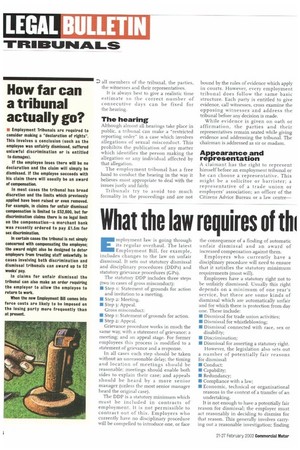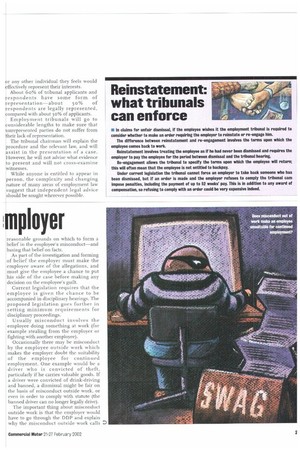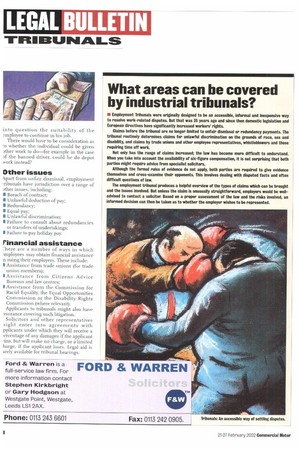what the law requires of till mployer
Page 26

Page 27

Page 28

If you've noticed an error in this article please click here to report it so we can fix it.
Employment law is going through its regular overhaul. The latest Employment Bill, for example, includes changes to the law on unfair dismissal. It sets out statutory dismissal and disciplinary procedures (DDPs) and statutory grievance procedures (GPs).
The statutory DDP includes three steps (two in cases of gross misconduct):
• Step I: Statement of grounds for action and invitation to a meeting.
• Step 2; Meeting.
• Step 3: Appeal. Gross misconduct: • Step I: Statement of grounds for action.
• Step a: Appeal.
Grievance procedure works in much the same way, with a statement of grievance; a meeting; and an appeal stage. For former employees this process is modified to a statement of grievance and a response.
In all cases each step should be taken without an unreasonable delay; the timing and location of meetings should be reasonable; meetings should enable both sides to explain their case; and appeals should be heard by a more senior manager (unless the most senior manager heard the original case).
The DDP is a statutory minimum which must be included in contracts of employment. It is not permissible to contract out of this. Employers who currently have no disciplinary procedure will be compelled to introduce one, or face the consequence of a finding of automatic unfair dismissal and an award of increased compensation against them.
Employers who currently have a disciplinary procedure will need to ensure that it satisfies the statutory minimum requirements (most will).
Employees have a statutory right not to be unfairly dismissed. Usually this right depends on a minimum of one year's service, but there are some kinds of dismissal which are automatically unfair and for which there is protection from day one. These include: • Dismissal for trade union activities; • Dismissal for whistleblowing; • Dismissal connected with race, sex or disability; • Discrimination; • Dismissal for asserting a statutory right. However, the legislation also sets out a number of potentially fair reasons for dismissal: • Conduct; • Capability; • Redundancy;
II Compliance with a law;
• Economic, technical or organisational reasons in the context of a transfer of an undertaking.
It is not enough to have a potentially fair reason for dismissal; the employer must act reasonably in deciding to dismiss for that reason. This generally involves carrying out a reasonable investigation; finding reasonable grounds on which to form a belief in the employee's misconduct—and basing that belief on facts.
As part of the investigation and forming of belief the employer must make the employee aware of the allegations, and must give the employee a chance to put his side of the case before making any decision on the employee's guilt.
Current legislation requires that the employee is given the chance to be
accompanied in disciplinary hearings. The proposed legislation goes further in setting minimum requirements for disciplinary proceedings.
Usually misconduct involves the employee doing something at work (for example stealing from the employer or fighting with another employee).
Occasionally there may be misconduct by the employee outside work which makes the employer doubt the suitability of the employee for continued employment. One example would be a driver who is convicted of theft, particularly if he carries valuable goods. If a driver were convicted of drink-driving
and banned, a dismissal might be fair on the basis of misconduct outside work, or even in order to comply with statute (the banned driver can no longer legally drive).
The important thing about misconduct outside work is that the employer would
have to go through the DDP and explain why the misconduct outside work calls into question the suitability of the employee to continue in his job. There would have to be consideration as to whether the individual could be given Dther work to do—for example in the case 3f the banned driver, could he do depot Nork instead?
Other issues
kpart from unfair dismissal, employment ribunals have jurisdiction over a range of )ther issues, including: II Breach of contract;
• Unlawful deduction of pay;
III Redundancy; ▪ Equal pay; I Unlawful discrimination; I Failure to consult about redundancies or transfers of undertakings; I Failure to pay holiday pay.
Financial assistance
:here are a number of ways in which imployees may obtain financial assistance n suing their employers. These include: I Assistance from trade unions (for trade union members); I Assistance from Citizens Advice Bureaux and law centres; I Assistance from the Commission for Racial Equality, the Equal Opportunities Commission or the Disability Rights Commission (where relevant). Applicants to tribunals might also have asurance covering such litigation. Solicitors and other representatives night enter into agreements with pplicants under which they will receive a ercentage of any damages if the applicant /ins, but will make no charge, or a limited harge, if the applicant loses. Legal aid is rely available for tribunal hearings.






















































































































































